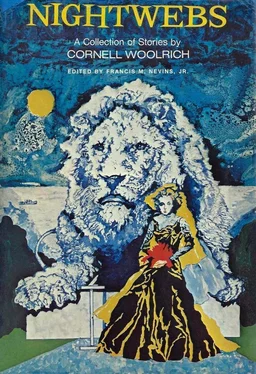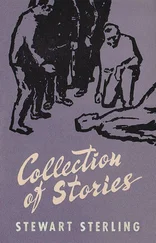It was not long after that he saw the newspaper. Its headline screamed across the top of the stand where it was being peddled. “Movie Murderer Confesses.” Lew picked it up, shaking all over.
The manager of Tom’s theater. Weeks, his name was. Somebody’d noticed that he’d been wearing a different suit during the afternoon show than the one he’d had on earlier. The seat behind Kemp’s, the dead man’s, had had chewing gum on it. They’d got hold of the suit Weeks had left at the dry-cleaner’s, and that had chewing gum on the seat of the trousers, too. He’d come in in a hurry around six, changed from one to the other right in the shop, the tailor told them. He’d had one there, waiting to be called for. He admitted it now, claimed the man had been breaking up his home.
Lew dropped the paper and the sheets separated, fell across his shoes.
It stuck to his shoe and Lew was like someone trudging through snow. “Movie Murderer Confesses — Murderer Confesses — Confesses...”
Subconsciously he must have known where he was going, but he wasn’t aware of it, was in a sort of fog in the broad daylight. The little blue and white plaque on the lamp-post said “Center Street.” He went slowly down it. He walked inside between the two green lamps at the police station entrance and went up to the guy at the desk and said, “I guess you people are looking for me. I’m Lew Stahl.”
Somehow, Lew knew it would be better if they put him away for a long while, the longer the better. He had learned too much that one night, got too used to death. Murder might be a habit that, once formed, would be awfully hard to break. Lew didn’t want to be a murderer.
Nelson pushed through the revolving-door at twenty to one in the morning, his squadmate, Sarecky, in the compartment behind him. They stepped clear and looked around. The place looked funny. Almost all the little white tables had helpings of food on them, but no one was at them eating. There was a big black crowd ganged up over in one corner, thick as bees and sending up a buzz. One or two were standing up on chairs, trying to see over the heads of the ones in front, rubbering like a flock of cranes.
The crowd burst apart, and a cop came through. “Now, stand back. Get away from this table, all of you,” he was saying. “There’s nothing to see. The man’s dead — that’s all.”
He met the two dicks halfway between the crowd and the door. “Over there in the corner,” he said unnecessarily. “Indigestion, I guess.” He went back with them.
They split the crowd wide open again, this time from the outside. In the middle of it was one of the little white tables, a dead man in a chair, an ambulance doctor, a pair of stretcherbearers, and the automat manager.
“He gone?” Nelson asked the intern.
“Yep. We got here too late.” He came closer so the mob wouldn’t overhear. “Better send him down to the morgue and have him looked at. I think he did the Dutch. There’s a white streak on his chin, and a half-eaten sandwich under his face spiked with some more of it, whatever it is. That’s why I got in touch with you fellows. Good night,” he wound up pleasantly and elbowed his way out of the crowd, the two stretcherbearers tagging after him. The ambulance clanged dolorously outside, swept its fiery headlights around the corner, and whined off.
Nelson said to the cop: “Go over to the door and keep everyone in here, until we get the three others that were sitting at this table with him.”
The manager said: “There’s a little balcony upstairs. Couldn’t he be taken up there, instead of being left down here in full sight like this?”
“Yeah, pretty soon,” Nelson agreed, “but not just yet.”
He looked down at the table. There were four servings of food on it, one on each side. Two had barely been touched. One had been finished and only the soiled plates remained. One was hidden by the prone figure sprawled across it, one arm out, the other hanging limply down toward the floor.
“Who was sitting here?” said Nelson, pointing to one of the unconsumed portions. “Kindly step forward and identify yourself.” No one made a move. “No one,” said Nelson, raising his voice, “gets out of here until we have a chance to question the three people that were at this table with him when it happened.”
Someone started to back out of the crowd from behind. The woman who had wanted to go home so badly a minute ago, pointed accusingly. “He was — that man there! I remember him distinctly. He bumped into me with his tray just before he sat down.”
Sarecky went over, took him by the arm, and brought him forward again. “No one’s going to hurt you,” Nelson said, at sight of his pale face. “Only don’t make it any tougher for yourself than you have to.”
“I never even saw the guy before,” wailed the man, as if he had already been accused of murder, “I just happened to park my stuff at the first vacant chair I—” Misery liking company, he broke off short and pointed in turn. “He was at the table, too! Why doncha hold him, if you’re gonna hold me?”
“That’s just what we’re going to do,” said Nelson dryly. “Over here, you,” he ordered the new witness. “Now, who was eating spaghetti on his right here? As soon as we find that out, the rest of you can go home.”
The crowd looked around indignantly in search of the recalcitrant witness that was the cause of detaining them all. But this time no one was definitely able to single him out. A white-uniformed busman finally edged forward and said to Nelson: “I think he musta got out of the place right after it happened. I looked over at this table a minute before it happened, and he was already through eating, picking his teeth and just holding down the chair.”
“Well, he’s not as smart as he thinks he is,” said Nelson. “We’ll catch up with him, whether he got out or didn’t. The rest of you clear out of here now. And don’t give fake names and addresses to the cop at the door, or you’ll only be making trouble for yourselves.”
The place emptied itself like magic, self-preservation being stronger than curiosity in most people. The two table-mates of the dead man, the manager, the staff, and the two dicks remained inside.
An assistant medical examiner arrived, followed by two men with the usual basket, and made a brief preliminary investigation. While this was going on, Nelson was questioning the two witnesses, the busman, and the manager. He got an illuminating composite picture.
The man was well known to the staff by sight, and was considered an eccentric. He always came in at the same time each night, just before closing time, and always helped himself to the same snack — coffee and a bologna sandwich. It hadn’t varied for six months now. The remnants that the busman removed from where the man sat each time, were always the same. The manager was able to corroborate this. He, the dead man, had raised a kick one night about a week ago, because the bologna sandwich slots had all been emptied before he came in. The manager had had to remind him that it’s first come, first served, at an automat, and you can’t reserve your food ahead of time. The man at the change-booth, questioned by Nelson, added to the old fellow’s reputation for eccentricity. Other, well-dressed people came in and changed a half-dollar, or at the most a dollar bill. He, in his battered hat and derelict’s overcoat, never failed to produce a ten and sometimes even a twenty.
“One of these misers, eh?” said Nelson. “They always end up behind the eight-ball, one way or another.”
The old fellow was removed, also the partly consumed sandwich. The assistant examiner let Nelson know: “I think you’ve got something here, brother. I may be wrong, but that sandwich was loaded with cyanide.”
Читать дальше












